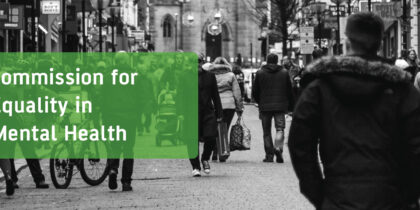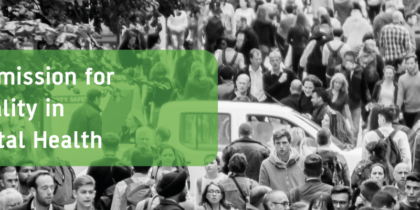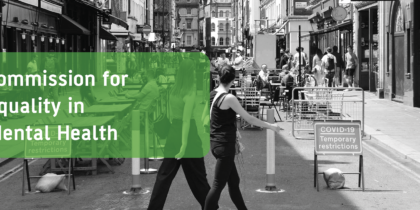By Marsha McAdam
This time last year I attended the Directory of Social Change Awards as I had been shortlisted under the Influencer of the Year Category. On the night, Emma from the Centre met with me and my son. We headed over to the Houses of Parliament where the Awards were being held. When I was announced as runner up for the Category, it capped off an already brilliant time that I had spent in London with my son.
It is only in the last few years that I have felt I have purpose in life, and it has been due to having my voice heard, and from there going on to help shape mental health services. I have a primary diagnosis of Borderline Personality Disorder (otherwise known as Emotionally Unstable Personality Disorder), recurrent depression, fibromyalgia, type 2 diabetes, non-alcoholic fatty liver disease, asthma and a few other debilitating health conditions. My life has at times been very chaotic and pretty much out of control. I was known to services, but not in a good way: the triage staff at my local A&E used to dread seeing me. It was the deep sigh and the “Oh G…, It’s not Marsha again. Again!”. Then in 2010, through Mentalization Based Therapy (MBT) I was able to understand why I felt the way I did, and also that it was okay to feel that way from time to time. That I could experience thoughts and feelings without being terrified by them and without acting impulsively, as I had done previously. It did many things for me but most importantly, it made me kind(er) and more compassionate towards myself. I started to like myself and even have a little self-confidence, or at least I do sometimes.
I was able to understand why I felt the way I did, and also that it was okay to feel that way from time to time. That I could experience thoughts and feelings without being terrified by them and without acting impulsively
A few years ago, I became the first ‘service user’ co-chair of the Greater Manchester Personality Disorder Strategy with my co-chair Warren Heppolette. It was a pioneering project of ‘patients leading the way’. We had three mental health trusts and a young people’s mental health charity (42nd Street) all represented by Experts by Occupation and three of my fellow Experts of Experience. While the strategy has, in my opinion, been slow at times to get rolled out across Greater Manchester, I am hopeful about the changes emerging and the dysfunctional aspects of services that are starting to be addressed. Money is now being invested. And there is finally focus on the stigmatisation that has bedevilled services working with individuals like me with a BPD label.
It was through being involved with this work that Centre for Mental Health approached me to write a blog for them. It has been both pleasurable as well as healing to be involved with the Centre’s various projects over this time. One of the most interesting ones was back in December 2019 when I facilitated four workshops here in Greater Manchester which then fed into the excellent and timely Commission for Equality in Mental Health report that was released in November last year.
One workshop focused around women’s mental wellbeing (where 22 women from diverse communities from across Greater Manchester came along) and another focused on men’s mental wellbeing. Both workshops identified substantial inequalities that fed into the Commission’s report. It is striking how many of the inequalities identified at these workshops, for example racial inequalities and high levels of deprivation, have become much more apparent since the beginning of Covid-19. It is gratifying to know that Centre for Mental Health have used the information we collected to highlight the impact of this.
It is striking how many of the inequalities identified at these workshops have become much more apparent since the beginning of Covid-19
I am also a member of the Speakers Collective which is a social enterprise that works together with a shared commitment to challenge stigma, facilitate important conversations and promote learning on a variety of social issues. Last year I hosted a Meaningful Conversation which focused on some of the findings from the Commission for Equality in Mental Health. This conversation identified the unfairness of the systems we work with, both structural but also in people’s values and prejudices.
As I said already, one of the labels I carry is personality disorder (PD). A few years ago, I attended the PD Consensus Statement which was co-chaired by Sir Norman Lamb and Sue Sibbald. The Consensus Statement of clinicians, policy makers, academics and users of PD services made several good points. The statement recognises that we are distinctive people because we have a unique set of characteristics that we call ‘personality’. It then says that “Most people develop enough awareness of their personality characteristics and, most of the time, can keep them in good enough balance that they can do what they need to do in life, be reasonably happy most of the time and have stable relationships which satisfy them and others”. The statement explains that people like me “experience persistent distress in their lives” which stops them from being able to keep the balance needed in order to do what they need to do. This then contributes to them acquiring the personality disorder diagnosis, which includes emotional and thinking difficulties that affect the way they relate to others or understand themselves. The difficulties are not minor; they occur across a broad range of social situations and lead to significant problems in occupational and social performance.
I own up to having had trouble with relationships. I am not so happy for that to be attributed to something unchangeable like my personality
The reason I highlighted it here is because it points to problems in relationships. Problems that the person has with other people. It is an accurate description that there are troubles in relationships, and it is accurate to say that these are tenacious and dogged difficulties. But these problems are driven by persistent and deep distress. It is not accurate to attribute it to something that is supposed to be one’s identity – one’s personality. I own up to having had trouble with relationships. I am not so happy for that to be attributed to something unchangeable like my personality. Before MBT, I didn’t feel confident in my own thoughts and was a recluse. But the therapy has given me hope and confidence and – most importantly – I have started developing real relationships and friendships. I feel I have changed, or perhaps more accurately, that I am changing. I am still the same person.
I feel I have changed, or perhaps more accurately, that I am changing. I am still the same person
This coming year I have the privilege of partnering with Sarah Hughes and Professor Peter Fonagy, who is a co-founder of MBT. We are planning to do something around BPD and stigma, and I believe that none of this would have happened without the exemplar project in Greater Manchester. For people to truly be at the heart of decision-making, there needs to be willingness on the side of those there because of their occupation and those there on account of personal experience to build meaningful and productive relationships. This may be particularly challenging (on both sides) in the space of service design for individuals who are persistently distressed and have difficulties with maintaining relationships. It requires patience and empathy but it is worthwhile because the service is then co-created. Listening to both the good and the bad experiences of service users, carers and their friends not only validates some of their worries and concerns; but also by doing so, you may just give them a purpose, as it has done for me.









